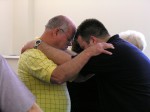In Friday’s post I mentioned a few rules-to-live-by for preachers that our mentoring group down in Waco had discussed last week. Jim Martin presented these regular practices to us as paramount to his preaching ministry. And he had asked us to bring a few of our own.
These are the three that I brought:
 Pray with everybody – nobody comes to see me in my study without spending some of that time in prayer. If you’re coming to my office to complain or confess or to ask questions or to share something personal or to ask for advice, I believe my number one job is to give spiritual guidance. I must speak to you out of my knowledge of the Scriptures, out of my relationship with God, and out of the love I have for you as a brother or sister in Christ. And that conversation must be bathed in prayer. The same is true if I come visit you. I will not leave your home or your office or your hospital room without praying to God with you.
Pray with everybody – nobody comes to see me in my study without spending some of that time in prayer. If you’re coming to my office to complain or confess or to ask questions or to share something personal or to ask for advice, I believe my number one job is to give spiritual guidance. I must speak to you out of my knowledge of the Scriptures, out of my relationship with God, and out of the love I have for you as a brother or sister in Christ. And that conversation must be bathed in prayer. The same is true if I come visit you. I will not leave your home or your office or your hospital room without praying to God with you.
Together prayer. Intercessory prayer. Community prayer. It sets the tone, it prepares our hearts and minds, it centers us on what’s really important as we talk about whatever needs to be talked about. I believe prayer very clearly communicates to my conversation partners my priorities in giving counsel from a spiritual perspective, not a worldly one. It also communicates that I, myself, understand I’m not qualified to be giving any counsel at all. Whatever wisdom I have comes directly from our gracious Father.
 Be transparent – some of our shepherds at Legacy say one of the reasons they brought me to this church is because I’m so open with everybody. When I hear that, I’m quick to say — mostly joking — that the openness will also be the reason they fire me.
Be transparent – some of our shepherds at Legacy say one of the reasons they brought me to this church is because I’m so open with everybody. When I hear that, I’m quick to say — mostly joking — that the openness will also be the reason they fire me.
I don’t hide anything from anybody. I’m honest with my feelings, with my sins, with my dreams, with my frustrations, with my love for God and for this church, and with my opinions. By the grace of God, as Paul says, I am what I am. I’m a work in progress. I’m trying really hard. I’m inadequate in many ways. But I’ve got Holy Spirit power inside me. I’m not afraid of that.
If we’re really going to live in Christian community with one another, if we’re really going to love each other like brothers and sisters, if we’re really going to accept and trust and defend and respect one another, if we’re really going to confess and share and be open with one another — and I preach all those things — then I must be the one to model it. And I do. You never have to wonder where I stand or what I think. I’m out there. Vulnerable. Open. Honest. It does rub some people the wrong way, I know. Not because they don’t like it, I think, but because they’re not used to it.
 Acknowledge wins for the elders – I’ll never forget listening to Eddie Sharp talk about preachers and elders several years ago at an Austin Grad Sermon Seminar. (I think I know why elders and preachers have historically butted heads. I understand what causes it. It’s wrong. There’s nothing right about it. But I get it.) Eddie made it crystal clear to me in an afternoon session in May 2006 that, of all the people in our congregations, elders have the job description that most closely matches that of the preachers. Elders have the same frustrations, the same feelings, the same dreams, the same struggles, the same gifts, the same doubts, the same everything.
Acknowledge wins for the elders – I’ll never forget listening to Eddie Sharp talk about preachers and elders several years ago at an Austin Grad Sermon Seminar. (I think I know why elders and preachers have historically butted heads. I understand what causes it. It’s wrong. There’s nothing right about it. But I get it.) Eddie made it crystal clear to me in an afternoon session in May 2006 that, of all the people in our congregations, elders have the job description that most closely matches that of the preachers. Elders have the same frustrations, the same feelings, the same dreams, the same struggles, the same gifts, the same doubts, the same everything.
But here’s the line that nailed me, the line I’ll never forget: “You preachers are always looking for affirmation and respect from your elders; you have no idea that your elders are all looking for affirmation and respect from you.”
Really? Sometimes I can’t hardly believe that. But what if it’s true?
I always try to compliment our shepherds, to congratulate them on jobs well done, to point out to the church when they do something special. When I recognize compassion in an elder, I point it out to him and thank him. When I see generosity or kindness in one of my shepherds, I acknowledge it and tell him how wonderful it is. See, in church ministry, it’s really difficult to judge wins and losses. It’s not like looking at numbers or balancing ledgers or meeting goals. How do you know if you’re becoming more like Christ? How can you tell if your congregation is growing spiritually? They need to be congratulated for the “wins” that you see. I tell them that I love them. I tell them I appreciate their hard work and their dedication to our flock. And I tell them I support them and that I have their back. If you’re a preacher, I think your elders need that from you.
Preaching for a local congregation is a difficult job. I still don’t feel very good at it. I’m certain I’ll never stop learning how to do it better. I often tell people it’s the hardest work I’ve ever done, but absolutely the most rewarding. Those rewards and blessings come from our God who calls us and equips us for the task. It all comes from him. And it’s done in order to bring him eternal glory and praise.
Peace,
Allan
Leave a Reply